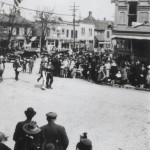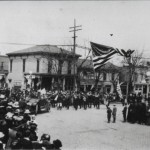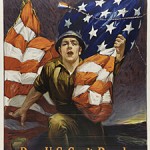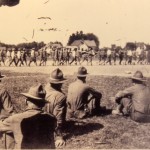It all began with a single shot. Nearly 100 years ago, on July 28, 1914, Serbian Gavrilo Princip assassinated Archduke Franz Ferdinand, heir to the throne of the Austro-Hungarian Empire on a back street in Sarajevo. Austro-Hungarian demands of Serbia were refused and their subsequent invasion of Serbia started a domino effect between allies on both sides that quickly drew all of Europe into war.
While Europe suffered through a horrific and bloody stalemate, the United States maintained a strict non-interventionist policy. While not actively participating in the War, the United States was an important supplier to the United Kingdom and other Allies. In 1917, Germany, in an effort to turn the tide of the war, declared unrestricted submarine warfare. They hoped to disrupt supply lines to England and starve them out of the war before United States, angered by attacks on American ships, joined the war. However, England held out and the United States, furious over hostile acts by Germany, declared war on Germany on April 6, 1917.
When war was declared on April 6, the United States had a small, ill equipped army. But a draft was implemented and soon nearly three million new soldiers swelled the ranks of the American military. Back home in Delphos, the local boys flocked to recruiting stations to join the fight. Those who passed their physical were soon off to camp to train, some leaving from the Delphos train station. Camp Sherman in Chillicothe, Ohio was one of the largest military training camps in the nation and trained more than 40,000 soldiers before the war ended. Local folks could keep track of their boys in the military through a poster displayed in the window of the Delphos Hardware Company, today ACE Hardware. The poster listed the names of all local boys in the army, those from both Delphos and the surrounding countryside. The names were marked with a blue pin to signify they were in the army and still in the United States. A red pin meant they were stationed overseas while a gold star meant they had been killed in the war. This poster is on display on the second floor of the Canal Commission Museum.
While the boys were preparing to fight, the rest of the country mobilized to support the war effort. Liberty Bonds were issued by the government to fund the war and huge rallies were held to encourage citizens to buy these bonds. The government also issued quotas to communities for Liberty Bonds to encourage their sale. In October 1917, Delphos became the first city in the United States to oversubscribe its quota of Liberty Bonds. Delphos was issued a quota of $109,000 but within a few days had raised more than $166,000. The city also raised money for the Red Cross through a “big auction”. Among the more than 175 items offered in the auction were: one medical visit from Dr. Egts, one chicken from Dr. Mauk, one case of pop from the Delphos Bottling Works, one Shetland pony from John Buettner, a sheep from Dr. Wolfe, one box of cigars from the Phelan Hotel and $5 worth of dental work from Dr. J. N. Sadler.
Patriotism for the war effort had its dark side as well. Anti-German hysteria swept the country and Delphos, despite its heavy German ancestry, was not spared. In March 1918 several local men were alleged to have made pro-German comments. A small crowd that had gathered downtown to discuss the accusations quickly swelled to three to four hundred. The crowd, let by prominent Delphos citizens, marched through town to the homes of the accused and forced them into the street to prove their patriotism by kissing or saluting the flag. Several of the accused were tipped off about the mob and fled town, not returning until civility returned, at the urging of Mayor Leasure, two days later. City businesses also faced accusations as the Deisel Wemmer Cigar Factory and the Delphos Herald both took out advertisements in the local paper denouncing the pro-German accusations against them and declaring their loyalty to the United States. Locally both city schools ceased German language classes, German Township in Allen County was renamed American Township, German books were burned in Ottawa and the Schumm School near Willshire was dynamited for continuing to teach the German language. Those who it was felt had not bought enough Liberty Bonds were labeled “slackers” and had their barns or cars painted yellow.
On April 6, 1918 Liberty Day was declared to commemorate the first anniversary of the United States’ entry into the war. A huge parade was held in downtown Delphos led by Thomas Norris dressed as Uncle Sam. Mothers of all Delphos soldiers were invited to ride in motor cars provided by local citizens. The parade, witnessed by thousands, wound through a downtown awash in flags and patriotic bunting.
The first troops from the United States landed in France in June 1917 although the bulk of American troops did not join the war until the spring of 1918. The war weary troops in Europe welcomed the boost in manpower and slowly the tide of the war began to change. Finally, after more than four, long years, the war ended at 11:00am on November 11, 1918. The last two Delphos soldiers to die in the war were Claude Walterick, who died of wounds on October 31, 1918 and George Hemme who was killed in action on November 1. Walterick is buried in Flanders Field in Belgium while Hemme is buried in St. John’s Cemetery. The Veterans of Foreign Wars post established in Delphos in 1935 was named Walterick-Hemme Post 3035 in commemoration of these two soldiers.
While the world celebrated the end of the war and soldiers streamed home by the thousands, the dying did not stop. A virulent flu virus spread rapidly throughout the world in the spring and again in the fall of 1918. An estimated 500 million were affected worldwide with twenty to fifty million dying from the virus. An estimated 675,000 died in the United States. There was no cure or treatment for the disease and it was particularly deadly to young, healthy people. In the fall of 1918, the Delphos Board of Health closed schools, churches, lodge and club meetings, dances and parties, saloons, pool rooms, picture shows and all amusements and public gatherings. By December the new reports of infections had decreased enough that the ban on public gatherings was lifted. In early 1919 the flu continued to claim thousands of lives before essentially disappearing that summer.
It all began with a single shot. Nearly 100 years ago, on July 28, 1914, Serbian Gavrilo Princip assassinated Archduke Franz Ferdinand, heir to the throne of the Austro-Hungarian Empire on a back street in Sarajevo. Austro-Hungarian demands of Serbia were refused and their subsequent invasion of Serbia started a domino effect between allies on both sides that quickly drew all of Europe into war.
While Europe suffered through a horrific and bloody stalemate, the United States maintained a strict non-interventionist policy. While not actively participating in the War, the United States was an important supplier to the United Kingdom and other Allies. In 1917, Germany, in an effort to turn the tide of the war, declared unrestricted submarine warfare. They hoped to disrupt supply lines to England and starve them out of the war before United States, angered by attacks on American ships, joined the war. However, England held out and the United States, furious over hostile acts by Germany, declared war on Germany on April 6, 1917.
When war was declared on April 6, the United States had a small, ill equipped army. But a draft was implemented and soon nearly three million new soldiers swelled the ranks of the American military. Back home in Delphos, the local boys flocked to recruiting stations to join the fight. Those who passed their physical were soon off to camp to train, some leaving from the Delphos train station. Camp Sherman in Chillicothe, Ohio was one of the largest military training camps in the nation and trained more than 40,000 soldiers before the war ended. Local folks could keep track of their boys in the military through a poster displayed in the window of the Delphos Hardware Company, today ACE Hardware. The poster listed the names of all local boys in the army, those from both Delphos and the surrounding countryside. The names were marked with a blue pin to signify they were in the army and still in the United States. A red pin meant they were stationed overseas while a gold star meant they had been killed in the war. This poster is on display on the second floor of the Canal Commission Museum.
While the boys were preparing to fight, the rest of the country mobilized to support the war effort. Liberty Bonds were issued by the government to fund the war and huge rallies were held to encourage citizens to buy these bonds. The government also issued quotas to communities for Liberty Bonds to encourage their sale. In October 1917, Delphos became the first city in the United States to oversubscribe its quota of Liberty Bonds. Delphos was issued a quota of $109,000 but within a few days had raised more than $166,000. The city also raised money for the Red Cross through a “big auction”. Among the more than 175 items offered in the auction were: one medical visit from Dr. Egts, one chicken from Dr. Mauk, one case of pop from the Delphos Bottling Works, one Shetland pony from John Buettner, a sheep from Dr. Wolfe, one box of cigars from the Phelan Hotel and $5 worth of dental work from Dr. J. N. Sadler.
Patriotism for the war effort had its dark side as well. Anti-German hysteria swept the country and Delphos, despite its heavy German ancestry, was not spared. In March 1918 several local men were alleged to have made pro-German comments. A small crowd that had gathered downtown to discuss the accusations quickly swelled to three to four hundred. The crowd, let by prominent Delphos citizens, marched through town to the homes of the accused and forced them into the street to prove their patriotism by kissing or saluting the flag. Several of the accused were tipped off about the mob and fled town, not returning until civility returned, at the urging of Mayor Leasure, two days later. City businesses also faced accusations as the Deisel Wemmer Cigar Factory and the Delphos Herald both took out advertisements in the local paper denouncing the pro-German accusations against them and declaring their loyalty to the United States. Locally both city schools ceased German language classes, German Township in Allen County was renamed American Township, German books were burned in Ottawa and the Schumm School near Willshire was dynamited for continuing to teach the German language. Those who it was felt had not bought enough Liberty Bonds were labeled “slackers” and had their barns or cars painted yellow.
On April 6, 1918 Liberty Day was declared to commemorate the first anniversary of the United States’ entry into the war. A huge parade was held in downtown Delphos led by Thomas Norris dressed as Uncle Sam. Mothers of all Delphos soldiers were invited to ride in motor cars provided by local citizens. The parade, witnessed by thousands, wound through a downtown awash in flags and patriotic bunting.
The first troops from the United States landed in France in June 1917 although the bulk of American troops did not join the war until the spring of 1918. The war weary troops in Europe welcomed the boost in manpower and slowly the tide of the war began to change. Finally, after more than four, long years, the war ended at 11:00am on November 11, 1918. The last two Delphos soldiers to die in the war were Claude Walterick, who died of wounds on October 31, 1918 and George Hemme who was killed in action on November 1. Walterick is buried in Flanders Field in Belgium while Hemme is buried in St. John’s Cemetery. The Veterans of Foreign Wars post established in Delphos in 1935 was named Walterick-Hemme Post 3035 in commemoration of these two soldiers.
While the world celebrated the end of the war and soldiers streamed home by the thousands, the dying did not stop. A virulent flu virus spread rapidly throughout the world in the spring and again in the fall of 1918. An estimated 500 million were affected worldwide with twenty to fifty million dying from the virus. An estimated 675,000 died in the United States. There was no cure or treatment for the disease and it was particularly deadly to young, healthy people. In the fall of 1918, the Delphos Board of Health closed schools, churches, lodge and club meetings, dances and parties, saloons, pool rooms, picture shows and all amusements and public gatherings. By December the new reports of infections had decreased enough that the ban on public gatherings was lifted. In early 1919 the flu continued to claim thousands of lives before essentially disappearing that summer.

“Liberty Day 1918”
Thomas Norris, dressed as Uncle Sam, leads the Liberty Day Parade through downtown Delphos.















Speak Your Mind